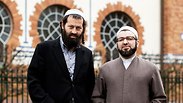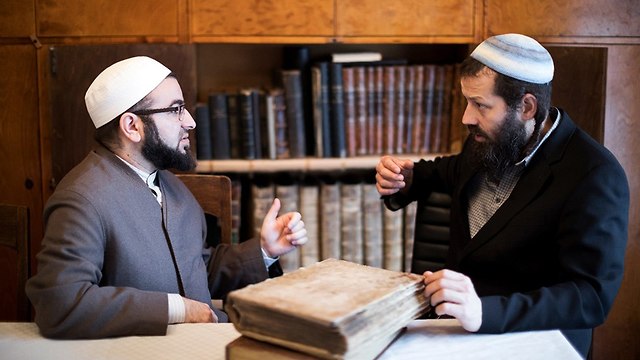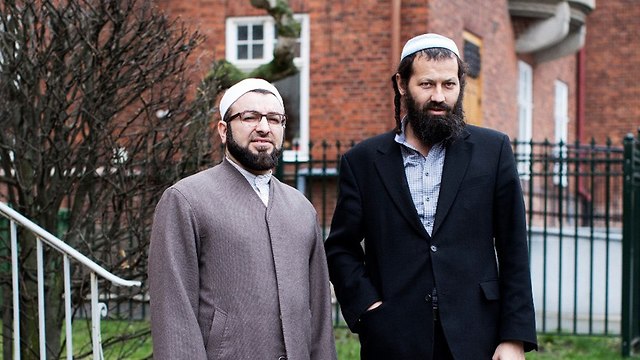
Moshe-David HaCohen and Salahuddin Barakat

Religious leaders declare end to Jewish-Muslim conflict in Malmö
Moshe-David HaCohen and Salahuddin Barakat, the heads of the Jewish and Muslim communities in Sweden's third-largest city, will publish joint ad in Friday paper, announcing: 'Jews and Muslims in Malmö stand together in the fight against anti-Semitism, Islamophobia, and any form of racism and discrimination against minorities.'
The heads of the Jewish and Muslim communities in Malmö, Sweden have decided to turn over a new leaf. On Friday, they will announce the end of the conflict between their two communities.
There are some 80,000 Muslims in Malmö alone, while the whole of Sweden contains around 20,000 Jews. Malmö is home to 2,000 Jews.
But in recent years, Sweden in general and Malmö in particular have seen a spike in anti-Semitic incidents—from harassment and vandalism to violent attacks against members of the Jewish community—leading many Jews to leave.
Anti-Semitism has become an almost daily occurrence in the city, with incidents such as arson at the Jewish cemetery, threats, verbal abuse and objects being thrown at Jews.
The heads of the Jewish and Muslim communities plan to publish a joint ad in Friday's edition of the main newspaper in southern Sweden, announcing the end of the conflict between them.
"We, the Jews and Muslims living in Malmö, are uniting against any display of discrimination, hatred, prejudice and xenophobia. Jews and Muslims in Malmö stand together in the fight against anti-Semitism, Islamophobia, and any form of racism and discrimination against minorities," the ad will say.
"We believe meeting and getting to know one another and our traditions will help us better appreciate and respect one another. We are convinced this is the only way forward for a shared, better and safer future in the city of Malmö. Shabbat Shalom, Eid Mubarak."
Moshe-David HaCohen, the rabbi of the Malmö Jewish Community, noted that "The fact the Muslim community and the Jewish community are coming together in an official capacity is not an obvious thing, particularly in Malmö, and that requires courage from both.
"At the same time, there is a deep-rooted understanding here that there is a great advantage to the other working for you and representing you, rather than you just representing yourself. When Jews come out against Islamophobia and Muslims against anti-Semitism, it's surprising and convincing."
He went on to say that "the fact the Muslim leadership in the city took responsibility for the safety of the Jews is not merely a statement, it has impact on the ground, as we've seen over the past year. We have a shared work to strengthen our identities in a secular country, and this receives expression in the ad being published in honor of Shabbat and Eid al-Fitr."
Salahuddin Barakat, the founder of Islamakademin in Malmö, added that "The work the Jewish community and Muslim community in Malmö are doing together is necessary to the future of minorities in Sweden. Publishing a positive statement of solidarity and appreciation of our holidays is an important part of our work."
Rabbi HaCohen and Barakat joinly founded "Amanah: The Jewish and Muslim Trust and Faith Project" in the city.
The two were brought together by The Religious Peace Initiative, headed by former minister Rabbi Michael Melchior.
Melchior lamented the fact Malmö has made headlines in recent years only in negative connotations and welcomed the joint statement. "This is wonderful news. There is now a spark of hope because of a true and deep connection between the communities," he said.

















